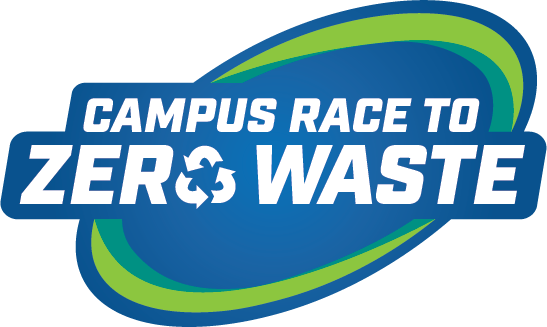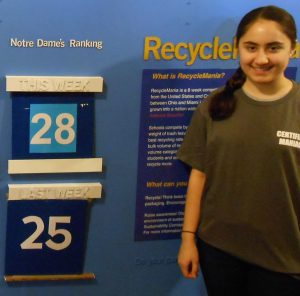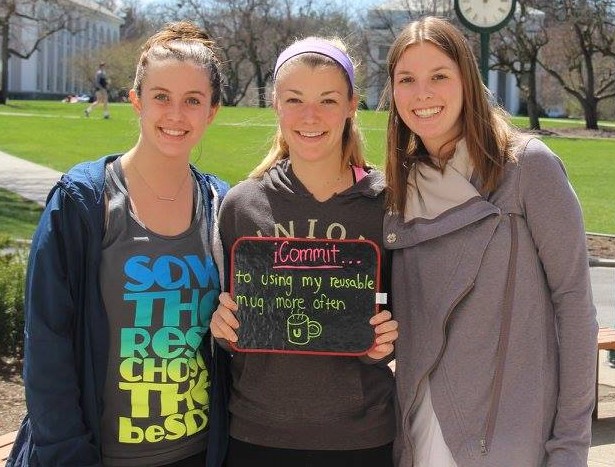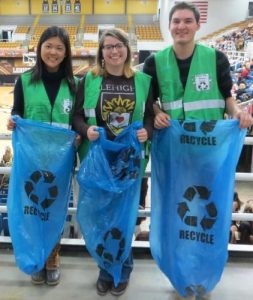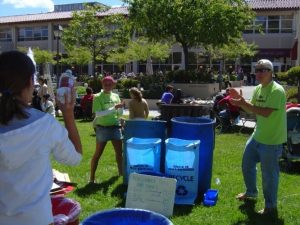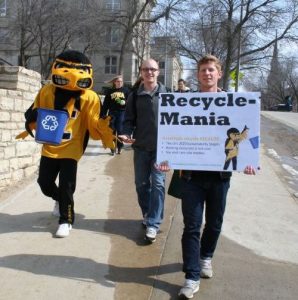Follow the steps in this checklist to register your campus, prep for the competition, plan your outreach campaign and report your data.
STEP 1
Register Your Campus
Create or login to your ReTRAC account to sign up.to determine which your school will participate in.
After creating an account you will receive an auto-generated confirmation email needed to activate your account.
Login to ReTRAC Connect account to complete and submit this form with details about how your school will participate. Once submitted, you will receive a confirmation email directly from RecycleMania within a few days. Within a few days, you will receive a confirmation email directly from RecycleMania. Once you receive the confirmation email, you can find your school on the Participating Schools page.
If you do not receive the confirmation email or have questions about your registration please contact us at recyclemania@nwf.org.
Schools participating in any of the per capita-based categories will be prompted to list their institution’s student and staff population when completing their Profile Information Survey. Campus population can be measured many different ways, so to use comparable numbers when calculating the competition results, RecycleMania uses a standardized methodology as follows:
- Full time equivalent (FTE)
- 12 month average student enrollment
- Student and staff for the entire institution, including auxiliaries and satellite facilities
How to determine your school’s FTE population:
- United States, participating in Competition Division: Use the population shown for your school on this sheet. This data is derived from the US Dept. of Education’s IPEDS database. See below for a full explanation. *Contact CR2ZW if you do not see your campus listed or believe the numbers shown for your campus are incorrect.
- Canada or international: School will need to consult campus record keepers for the appropriate FTE numbers to report.
- Benchmark Division participating with a portion of campus: You will need to determine the FTE population located in the specific area of campus you’re participating with.
Explanation of IPEDS Database
The Campus Race to Zero Waste relies on population data from the U.S. Department of Education for most participating schools to ensure as fair a comparison as possible. This online database, IPEDS (Integrated Postsecondary Education Data System compiles data reported directly from US colleges and universities to calculate the FTE population using various methodology. Because IPEDS’ numbers can be up to two years old, with occasional differences in how they define an institution, schools should contact CR2ZW if the numbers shown for your campus look significantly wrong.
STEP 2
Prep for the Competition
Review the rules, arrange to a system to get weight data and get familiar with the how results are displayed.- Review Competition Rules. Become familiar with what recycling and other waste materials to include, how they should be measured and other competition rules.
- Plan for Tracking Weights. Determine how you will measure weights and who you will need to gather data from during the competition.
- Set up Result Displays. Review the result display options and set up your school’s customized result displays based on the rankings you would like to highlight on your campus.
STEP 3
Plan Outreach Campaign
Set goals for the competition, organize your outreach team and plan events and activities to engage the campus.What do you want to achieve by participating in the Campus Race to Zero Waste? Raise awareness with students in the residence halls? Raise the profile of the recycling program with campus decision makers? Draw attention to a new food composting program? Take the time to define one or two primary goals to guide the planning process.
Set a specific challenge or goal(s) that you want students, staff or the entire campus to achieve during the competition. Make sure it achievable during the time frame of the competition. Just because your school may be officially ranked in a multiple categories doesn’t mean you can’t narrow or refocus the specific challenge you communicate publicly. If your school is unlikely to rank highly in the national rankings, consider other ways to frame success. Examples:
- Compete against a specific rival(s) you are competitive against.
- Subgroupings such as other schools within your state or athletic conference.
- Focus on categories you’re most competitive in.
- Compete Against Your Own Record – If beating other school isn't a big motivator, ignore the rankings altogether and frame a challenge around a previous benchmark of your school’s recycling or composting efforts. Example: increase the average amount of recyclables collected by 10% from week one and week eight of the tournament.
The most successful examples of school participation in the Campus Race to Zero Waste comes from those that build teams with stakeholders across campus. Involving students and staff from other areas of campus can help to ensure buy in and support from those areas and be a means to leverage additional resources to promote the school’s involvement. This acts as an advisory group to help plan the campaign and to coordinate their respective department’s involvement supporting the program. Separately, you may have a core team of student volunteers or education staff that is involved in the day to day activities.
Some potential groups to include in your team planning:
- Facilities or physical plant dept.
- Student environmental clubs
- Residence hall council
- Student govt. association
- Dining facilities
- Athletics dept.
- Bookstore
- Develop clear and concise messaging that relays what the competition is, what your campus plans to accomplish and how students/staff can help
- Emphasize positive messages over messages that criticize people for not doing better.
- Don’t automatically lead with the environmental benefits of recycling. Incorporate the economic advantages of recycling, or highlight the many products we use every day that contain recycled content.
- Relate recycling back to your specific school instead of talking about it broadly.
- Coordinate your activities to fit your goals and messaging. For instance, if you’d like to decrease the amount of recyclables ending up in the trash stream, engage in some dumpster diving and do a waste audit in a highly visible area.
- Involve students in crafting the message. They are often full of creative ideas and may even know what will work better than you do.
- Don’t put out all your messaging at the beginning only to let it peter out throughout the competition. Think strategically about timing messages so that your audience maintains interest and becomes curious about what’s coming next.
- Portray recycling as a normalized behavior conducted by everyone. We are social creatures after all and while we may not always admit it, we do like to feel included by participating in what’s popular.
Plan Activities
Organize fun, interactive activities that will engage and keep the interest of your audience. Find ideas and step-by-step instructions to plan activities by clicking here.
- Utilize the expertise of your school’s communications department to write and distribute a formal press release to both campus and off campus media outlets.
- Come up with trivia and other challenges on to post on social media and see if you can get students to extend the challenge by reaching out to friends at rival campuses.
- Create a dedicated RecycleMania webpage with up to date competition results and provide recycling facts specific to your campus. Or highlight various staff on campus that work on recycling, to bring a human face to the process.
- When planning attention getting activities make sure your campus paper and local media get notified well in advance.
- Take plenty of photos of your events. They serve as an engaging visual story of the competition and promote the idea that recycling is all the rage on campus.
- Reach out to high profile bloggers on your campus to encourage write ups about the competition and spur some friendly taunting with rivals.
- Collaborate with the department that manages the school’s homepage to see if you can get your participation placed in a prominent location during key points of the competition.
- Cozy up to your campus newspaper to see if they would be willing to run a regular weekly column during the Tournament that provides updates on the school’s ranking against your school’s rivals.
- Create scorecards that you can update each week, post around campus bulletin boards and on your website, and on the university cable network.
- Work with Residential Life staff to promote RecycleMania in the residence halls. Distribute flyers to residential advisors to hang on bulletin boards in the residence buildings.
- Work with your communication dept or whoever manages the official school website to see if you can get RecycleMania featured on the homepage during the kickoff or other key promotional time.
- Make napkin holder inserts for dining halls. Change them out each week with update messages and rankings.
- Create slides or short videos about your participation to run on video monitors.
- Create pie chart signs with butcher paper to tape onto dumpsters that show what percentage of trash is recyclable items and a message to recycle more. Get permission to post them.
- Create chalk ads on sidewalks around campus. Get permission to do this first!
- Conduct promotional tabling, hosting recycling-related activities, interactive displays, and prize raffles in the main hall lobbies.
It’s not enough to issue a challenge, you also need to update people on the school’s progress toward achieving it. It’s important to share regular updates to maintain people’s interest and rally them to try harder as you get closer or fall short. And of course, congratulate your audience when they successfully meet the challenge or goal!
STEP 4
Report Your Data
After the competition starts, login to your ReTRAC account to report weights.Schools will log in to their Re-TRAC Connect account to report weight data. Weights for the eight-week categories including Diversion, Per Capita, Food Waste Organics, and Zero Waste are reported every week between Monday and mid-day Wednesday for the quantity of waste materials collected during the the previous week. Weights submitted after Wednesday of a given week may not be reflected in the updated results until the following week.
Reporting for GameDay Basketball, Electronics, Race to Zero Waste and the Campus Engagement Case Study competition are each done on a single occasion. Review the competition Calendar to see when specific reports are due.
Pre-Season
Schools are encouraged to track and report weight data during a two week “pre-season” period immediately preceding the official eight-week competition. Though optional, pre-season reporting is an opportunity for schools to work out the kinks to ensure they’re able to get the necessary data before the official kickoff reporting data. School results will be published in an unofficial ranking, allowing them to see where they will likely be most competitive. This knowledge is important for setting goals and deciding where to focus outreach efforts.
STEP 5
View results
Updated results are published each week for the majority of categories.Updated results are posted to the Scoreboard section of the website each Friday for Diversion, Per Capita and Food Organics and the other eight week categories. Results are based on cumulative performance, building off the weights submitted for all previous weeks.
The final Schools that meet tracking requirements and select on their registration profile form to be included in the formal rankings (Competition Division) will be included alongside other schools in publicly displayed national results. All schools, including those not wishing to be included in the formal rankings (Benchmark Division), can also view customized results for their school’s performance on a unique Profile Page.
